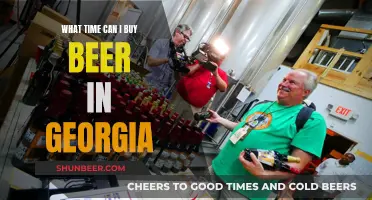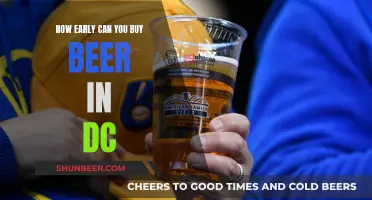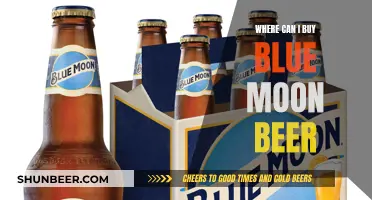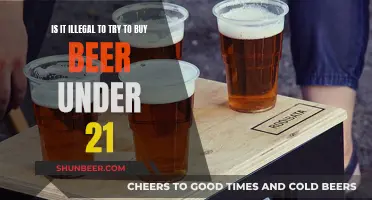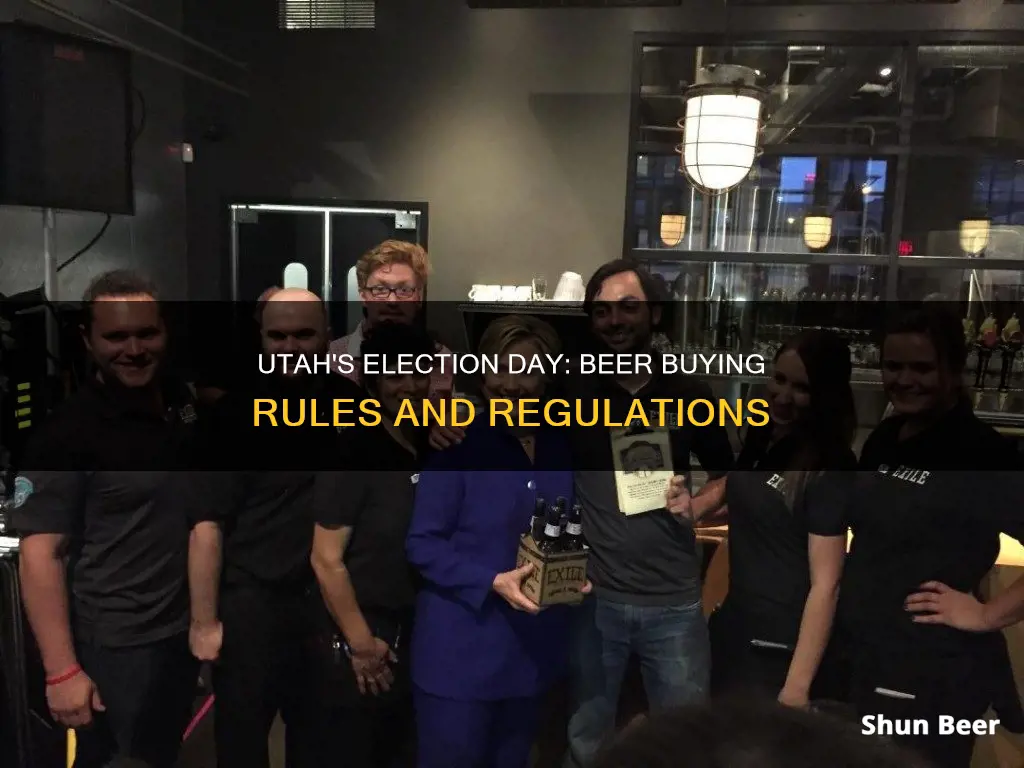
Utah has some of the most restrictive alcohol laws in the United States. In the past, the sale of alcohol was banned in the state on Election Day, but this law was changed years ago. While Utah liquor stores are open on Election Day, the sale of alcohol in bars and restaurants is subject to specific regulations and varies depending on the type of license the establishment has. For example, beer can be purchased in taverns, beer bars, and some restaurants that have a beer-only type license, but food must be ordered with alcoholic drinks in licensed restaurants.
| Characteristics | Values |
|---|---|
| Can you buy beer in Utah on election day? | Yes |
| Can you buy beer in grocery and convenience stores on election day? | Yes |
| Can you buy beer in Utah state liquor stores on election day? | Yes |
| Can you buy beer in Utah package agencies on election day? | Yes |
| Can you buy beer in Utah clubs and restaurants on election day? | Yes |
What You'll Learn
- Beer can be purchased in Utah on election day at grocery and convenience stores
- Utah's liquor stores are open on election day
- Utah's alcohol laws are some of the most restrictive in the United States
- Alcohol cannot be served in Utah bars and restaurants after 1 am
- Utah's blood alcohol content limit is 0.05%, the strictest DUI law in the country

Beer can be purchased in Utah on election day at grocery and convenience stores
Utah has some of the most restrictive alcohol laws in the United States. For example, a person must be 21 or older to buy or consume alcohol. The Utah Department of Alcoholic Beverage Services has regulated the sale of alcoholic beverages since 1935, two years after the end of Prohibition. Utah is one of 17 control states, meaning the state has a monopoly over the wholesaling and/or retailing of some or all categories of alcoholic beverages.
Utah law sets a limit of 4.0% alcohol by weight (5% ABV) in beer sold at grocery and convenience stores and at establishments operating under a "beer only" type license, such as taverns, beer bars and some restaurants. Beer over 4.0% by weight (5% ABV) is available in State Liquor Stores and Package Agencies and at clubs and restaurants licensed to sell liquor.
In 2019, a new bill replaced the 86-year-old law stating that 3.2% beer was the alcohol limit for brewing. It allows beers with 4% alcohol by weight or 5% ABV to be sold in grocery stores, convenience stores and on draft at bars and restaurants.
In 2008, Utah relaxed its Election Day alcohol sales ban, allowing sales at restaurants and private clubs. However, the sale of alcohol at package stores on Election Day is still banned in Utah.
Buying Beer Late in New York: What's the Limit?
You may want to see also

Utah's liquor stores are open on election day
Utah's liquor laws are some of the most restrictive in the United States. The Utah Department of Alcoholic Beverage Services (UDABS) has regulated the sale of alcoholic beverages since 1935, two years after the end of Prohibition. Utah is one of 17 control states, meaning the state has a monopoly over the wholesaling and retailing of alcoholic beverages.
In 2020, rumours circulated on social media that Utah's liquor stores would be closed on Election Day. However, the Utah Department of Alcoholic Beverage Control (UDABC) clarified that all state-run stores would be open on November 3, with most operating from 11 am to 7 pm, and some remaining open until 10 pm.
Utah's liquor laws have a history of being strict due to the influence of The Church of Jesus Christ of Latter-day Saints, to which 55% of Utah residents belong. The Church advises against the consumption of alcohol for its members. However, several attempts to make Utah a dry state failed, and in 1933, Utah voted to repeal the Eighteenth Amendment and ratify the Twenty-first Amendment, thus ending national alcohol prohibition.
While Utah's liquor laws have a reputation for being strict, there have been several reforms in recent years to make them less so. For example, in 2019, a new bill replaced an 86-year-old law, allowing beers with up to 5% alcohol by volume (ABV) to be sold in grocery stores, convenience stores, and on draft at bars and restaurants. In 2017, the "Zion Curtain" laws, which required partitions to separate restaurant bartenders from customers, were reformed. And in 2013, a law was passed allowing restaurant patrons to order alcohol before ordering food.
Despite these reforms, Utah's liquor laws continue to be a source of controversy and have been criticised for negatively impacting the state's business, economic growth, and tourism industry.
Where to Buy 5-Gallon Craft Beer Kegs?
You may want to see also

Utah's alcohol laws are some of the most restrictive in the United States
Utah's alcohol laws are influenced by the predominant religion, The Church of Jesus Christ of Latter-day Saints, which teaches its members to abstain from alcohol. The state has a government-controlled liquor system, maintaining full retail control over beer with an alcohol by volume (ABV) higher than 5%. This means that only specific stores are permitted to sell these beverages, and they are closed on Sundays and holidays.
- Alcoholic beverages with an ABV of up to 5% can be purchased in grocery and convenience stores.
- Higher ABV beer, wine, and liquor are available at state-run liquor stores, which are typically open from 11 am to 7 pm or 10 pm, Monday through Saturday.
- Breweries, wineries, and distilleries can sell alcohol every day of the week, but to-go beverages must remain closed while on their premises.
- Utah has the strictest driving under the influence (DUI) limit in the country, with a blood alcohol content (BAC) limit of 0.05%.
- Alcoholic beverages can only be served to adults over the age of 21 and a valid ID is always required.
- In restaurants, alcoholic drinks must be ordered with food. However, this is not required in taverns, breweries, and bars, which are licensed differently.
- Cocktails in Utah are limited to no more than 1.5 ounces of primary liquor, with a total drink size not exceeding 2.5 ounces when including secondary alcohols and liqueurs.
- It is illegal to bring any alcohol into Utah from outside the state.
While Utah's alcohol laws have become more relaxed in recent years, they still stand out as some of the most restrictive in the United States, presenting unique challenges for both visitors and residents.
Buying Beer in Caldwell, Ohio: What's the Deal?
You may want to see also

Alcohol cannot be served in Utah bars and restaurants after 1 am
Utah is one of seventeen control states, meaning the state has a monopoly over the wholesaling and retailing of alcoholic beverages. The Utah Department of Alcoholic Beverage Services (UDABS) has regulated the sale of alcoholic beverages since 1935, two years after the end of Prohibition.
Utah's alcohol laws restrict the hours during which alcohol can be served in bars and restaurants. Alcohol can be served from 10 am to 12:59 am in bars, and from 11:30 am to 11:59 pm during weekdays and 10:30 am to 11:59 pm on weekends in restaurants. These laws also vary depending on the type of establishment and license the establishment holds. For example, taverns may only sell beer, and they are allowed to do so from 10 am to 12:59 am.
In addition to the restrictions on service hours, Utah also has laws governing the types of alcohol that can be sold in certain establishments. For instance, beer sold in grocery and convenience stores and in establishments with a "beer-only" license, such as taverns and beer bars, is limited to 4.0% alcohol by weight or 5% ABV. Higher-ABV beers are only available in state liquor stores, package agencies, and licensed clubs and restaurants.
Utah's alcohol laws have been the subject of debate and attempts at reform over the years. Some people argue that the laws are too restrictive and hurt the state's tourism and business industries. Others believe that the laws are necessary to protect children and teens from exposure to alcohol consumption. Despite the debates, Utah's alcohol laws remain among the most restrictive in the United States.
Buying Beer: Can You Purchase Directly from Distributors?
You may want to see also

Utah's blood alcohol content limit is 0.05%, the strictest DUI law in the country
Utah's Strict DUI Law
Section-break
Utah has the strictest DUI limit in the country at 0.05% blood alcohol content (BAC). This limit applies to driving cars, motorboats, and even riding bikes. The state's low BAC limit means that it takes fewer drinks to exceed the legal limit compared to other states.
In 2019, Utah became the first and only state to implement a 0.05% BAC limit for driving. All other states and the District of Columbia use a 0.08% standard. The change in the law was driven by the Utah Legislature's passing of HB155 "Driving Under the Influence and Public Safety Revisions" in 2017, which took effect on December 30, 2018.
The National Highway Traffic Safety Administration (NHTSA) conducted a study on the impact of Utah's lower BAC limit. The study found that the state's fatal crash rate dropped by nearly 20% in 2019 compared to 2016. The NHTSA's deputy administrator, Steven Cliff, attributed the improved road safety and reduced traffic deaths to the new law, stating that it "saved lives and motivated more drivers to take steps to avoid driving impaired."
The NHTSA study also found that the negative economic effects and concerns raised by the restaurant and hospitality industry did not materialize. There was no spike in DUI arrests, and instead, a slight decrease from 8,828 in 2016 to 8,512 in 2019. Additionally, over 22% of drinkers in Utah reported changing their behavior, such as ensuring a sober ride was available, once the law took effect.
While Utah's stricter DUI law has been controversial, with critics arguing that it targets responsible drinkers and hurts small businesses and tourism, supporters, including traffic safety advocates and the National Transportation Safety Board, maintain that lower BAC limits deter drunk driving and save lives.
Understanding BAC Limits and DUI Charges in Utah
Section-break
It's important to understand that the BAC limit is not the sole factor in determining DUI charges in Utah. Even if your BAC is under the 0.05% limit, you can still be charged with DUI if you are too intoxicated to safely operate a vehicle. This means that law enforcement officers will consider observed impairment, such as erratic driving or slurred speech, when making an arrest.
Utah also has separatesection-break BAC limits for specific groups:
- Drivers under 21: Underage drivers are subject to the "not-a-drop" law, which means any measurable amount of alcohol in their system is illegal.
- Commercial drivers: Those with commercial driver's licenses (CDLs) can be charged with a DUI if their BAC is at least 0.04 grams.
- Alcohol-restricted drivers: Individuals with alcohol-related driving convictions who still have driving privileges can be charged with a Class B misdemeanor for driving with any measurable amount of alcohol in their system.
Staying Safe and Legal in Utah
Section-break
To stay safe and legal in Utah, it's important to plan ahead if you intend to drink. There are many options for a safe and sober ride home, including designated drivers, taxis, and ride-sharing services. Remember, every instance of impaired driving is 100% preventable, and there is no excuse for choosing to drink and drive.
Buying Beer in Kentucky on Sundays: What's Allowed?
You may want to see also



